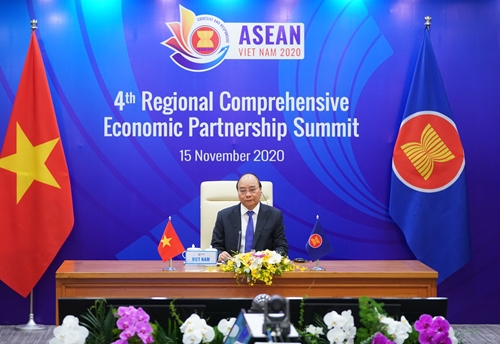In his opening remarks, Vietnamese Prime Minister Nguyen Xuan Phuc said the COVID-19 pandemic has adversely impacted global and regional trade and investment flows, including the countries participating in the RCEP talks.
    |
 |
|
PM Nguyen Xuan Phuc addresses the summit. (Photo: VGP) |
He lauded efforts made by relevant sides to address issues in the negotiations, saying he is delighted as after eight years of working hard, the sides have completely concluded the negotiations, enabling the signing of the agreement within the framework of the 37th ASEAN Summits and Related Summits.
The global and regional economies are facing huge obstacles and challenges caused by not only COVID-19 but also the decreased global trade, he said.
Therefore, the conclusion of the negotiations of the RCEP, the largest free trade agreement in the world, will send a strong message of ASEAN’s leading role in supporting the multilateral trade system, helping to create a new trading structure in the region, facilitating trade sustainably, developing the disrupted supply chains and supporting post-pandemic recovery.
Initiated by ASEAN, the deal is between ten member states of ASEAN - Brunei, Cambodia, Indonesia, Laos, Malaysia, Myanmar, the Philippines, Singapore, Thailand, and Vietnam, and the bloc's partners - China, Japan, the Republic of Korea (RoK), Australia and New Zealand.
According to Director of the Vietnamese Ministry of Industry and Trade’s Multilateral Trade Policy Department Luong Hoang Thai with provisions to reduce or remove tariffs on industrial and agricultural products, the RCEP will help firms in ASEAN member states boost exports, particularly to major trade partners.
He suggested Vietnamese companies improve their competitive edge by paying due regard to trade policies, renewing technologies, and landing large investments in services.
Vietnamese Minister of Industry and Trade Tran Tuan Anh said that once the RCEP takes effect, Vietnamese companies will have more opportunities to expand markets, join regional value chains, and attract more foreign investment.
Telecommunications, IT, garments and textiles, footwear, and agriculture can take huge advantage of import tariff reductions under the agreement, he stressed.
Source: VNA